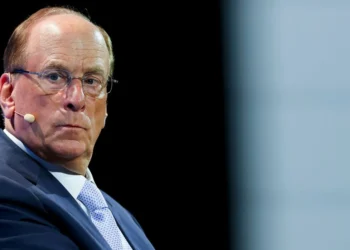WASHINGTON (Realist English). Despite economic volatility and growing national debt, the 10 richest Americans increased their wealth by $365 billion over the past year, according to a new analysis by Oxfam — a staggering rise equivalent to $1 billion per day. The report warns that this explosive growth in billionaire wealth underscores a widening gulf between the ultra-rich and the rest of the country.
By contrast, the median U.S. worker earned just over $50,000 in 2023, meaning it would take 726,000 years for 10 average workers to match the windfall gained by these billionaires in just 12 months.
“Billionaire wealth has increased astronomically while so many ordinary people struggle to make ends meet,” said Rebecca Riddell, Oxfam America’s senior policy lead for economic and racial justice. The report was released as Republican lawmakers advance a sweeping tax package that critics say would entrench wealth inequality and weaken key public safety net programs.
Musk leads the pack
Oxfam tracked wealth gains using Forbes’ Real-Time Billionaire List, measuring changes from April 2024 to April 2025. The biggest winner: Elon Musk, who saw his net worth climb by $186.1 billion, accounting for more than half of the total wealth increase. Musk, a key supporter of President Donald Trump’s return to office, is now widely seen as the world’s first potential trillionaire.
Other notable gains include:
- Mark Zuckerberg (Meta) and Rob Walton (Walmart): +$38.7 billion each
- Jim Walton (Walmart): +$36.5 billion
- Warren Buffett (Berkshire Hathaway): +$34.8 billion
Some billionaires, including Google co-founders Larry Page and Sergey Brin, saw their fortunes decline slightly.
Oxfam argues that the proposed Republican tax bill, championed by Trump and known as the “One Big Beautiful Bill Act,” would further skew the U.S. tax code in favor of the wealthiest households.
“We’re seeing a tax code being designed that would bring about the world’s first trillionaire,” Riddell said.
According to Oxfam, a 3% tax on wealth above $1 billion could raise $50 billion from just the top 10 billionaires — enough to provide food assistance for 22.5 million people for a year. But implementing a wealth tax remains politically and legally contentious, with critics citing valuation difficulties and constitutional questions.
GOP tax cuts favor the rich, analysis finds
The GOP legislation would extend and expand the 2017 Trump tax cuts, including permanent reductions in individual income taxes and new temporary tax breaks for tips and overtime pay.
According to the Congressional Budget Office (CBO), the bill would increase resources for U.S. households overall. However, the benefits would be deeply unequal:
- Households in the top 10% would see their resources rise by 2% by 2033
- The bottom 10% would see a 4% decline, due to reduced federal support
The Penn Wharton Budget Model projects the legislation would boost GDP by 0.5% in 10 years and 1.7% in 30 years, driven largely by increased savings and labor supply — fueled in part by a weaker social safety net.
But Penn Wharton also estimates that:
- 65% of the total tax benefits would flow to the top 10% of earners
- The bottom 20% of households would lose an average of $1,035 in 2026 from cuts to Medicaid, SNAP, and other programs
- The wealthiest 10% would receive $3.1 trillion in tax breaks over 10 years
Debt and deficit risks mount
The bill is advancing amid mounting concerns over the U.S. national debt, now exceeding $36 trillion. Last week, Moody’s Ratings downgraded the United States’ longstanding perfect credit rating, citing rising deficits and interest burdens.
The White House argues the GOP proposal will help stabilize the fiscal outlook by curbing spending. “This legislation won’t add to the deficit,” said Press Secretary Karoline Leavitt.
But Moody’s disagreed, stating it “does not believe that material multi-year reductions in mandatory spending and deficits will result from current fiscal proposals.”
The Committee for a Responsible Federal Budget warned the GOP plan would add $3.3 trillion to the national debt over a decade — and $5.2 trillion if temporary provisions are made permanent. The CBO estimates the increase at $3.8 trillion.
“This additional near-term borrowing could stoke inflation and push up interest rates,” the Committee said.
Political backlash
Senator Elizabeth Warren (D-Mass.) denounced the bill as a “massive giveaway” to the rich.
“Donald Trump and Republicans in Congress are trying to jam through massive tax giveaways for millionaires and billionaires who are only getting richer by the day. Billionaires don’t need another break — working people do,” she told CNN.
Meanwhile, the White House insists that Trump’s second-term economic priorities will reignite growth and restore prosperity for middle-class Americans.
“Wealth inequality in the United States actually decreased for the first time in decades during President Trump’s first term,” said spokesman Kush Desai, citing tax cuts, deregulation, and tariffs as drivers of success. “The One, Big, Beautiful Bill locks many of these successful policies in.”
The numbers are stark — $1 billion in new wealth per day for the richest Americans, while millions struggle with stagnant wages and shrinking benefits. The debate over the GOP tax bill is not just a fiscal battle; it is a contest over the future shape of the American economy. As inequality widens and debt balloons, the stakes are no longer theoretical. The U.S. is drifting toward a system where wealth begets power, and policy becomes its enabler.


















